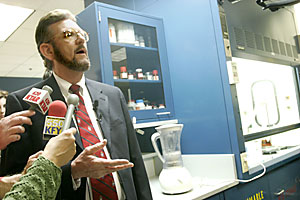 |
|
Courtney E. Smith/Arizona Daily Wildcat
|
In a demonstration in Phoenix, Todd Griffith, head of the Department of Public Safety crime labs in Arizona, explains how over-the-counter drugs containing psuedoephedrine can be combined with household items to make methamphetamines. Arizona Attorney General Terry Goddard plans to unveil legislation to tighten the sale of drugs containing ephedrine, a primary ingredient in meth.
|
|
|
By J. Ferguson
Arizona Daily Wildcat
Monday, January 30, 2006
Print this
Officials model cooking drugs
PHOENIX - The use of methamphetamines has reached epidemic proportions in Arizona, said the Arizona attorney general, who proved how easy it is to make the drugs during a demonstration Friday.
A criminalist from the Arizona Department of Public Safety crime lab combined over-the-counter cold medication, drain cleaner and iodine tablets to demonstrate the simplicity of making methamphetamines.
Arizona Attorney General Terry Goddard explained how common, inexpensive household items used in the simple recipe are responsible for the rapid growth in the drug's use in Arizona.
In response to the epidemic, Goddard said limiting access to the primary ingredient pseudoephedrine, found in over-the-counter drugs like Sudafed, is one of the best ways to curb meth use, beside shutting down the illicit drug labs frequently set up in homes.
Limiting the sales of pseudoephedrine would likely include a limit on other drugs that contain ephedrine, including norpseudoephedrine or phenylpropanolamine.
UA chemistry lecturer Steve Brown said although he is not familiar with the recipe to make meth from pseudoephedrine, he understands that it doesn't require training in chemistry classes.
"Chemistry is a lot like cooking; it is the combining of ingredients," Brown said.
Anyone who could follow directions could probably make methamphetamines, not just chemists, Brown said.
Currently, Arizona limits the sale of pseudoephedrine tablets by keeping them behind pharmacy counters and limiting the amount that can be purchased. But Goddard is working with Rep. Tom O'Halleran (R-1) to enact legislation to add to existing state laws.
Goddard said the current law "was weak," as it does not cover cold medications that contain ephedrine but are combined with other cold medications.
O'Halleran said the new legislation would be unveiled later this week.
Roughly 24 Arizona cities have enacted their own legislation limiting sales of ephedrine over the past year, Goddard said.
Goddard said his office does not have sufficient data to tell whether local laws have made a dent in residential meth labs because the laws have only recently been enacted.
Todd Griffith, who runs the four DPS crime labs in the state, said his agency cleans up hundreds of meth labs every year around the state. Limiting the sale of precursor chemicals should cut down on local meth production, he said.
University of Arizona Police Department spokesman Sgt. Eugene Mejia told the Arizona Daily Wildcat in December that the drug was not an issue on campus.
"It's very rare that we encounter meth on campus," Mejia said. "When we do, it is generally from outside sources, such as bike thieves and transients."
Goddard said limiting the sale of drugs that contain ephedrine was "one of two fronts" on the war against the meth epidemic. He said Arizona would also have to fight smugglers who bring meth into Arizona from "super drug labs" in Mexico.
